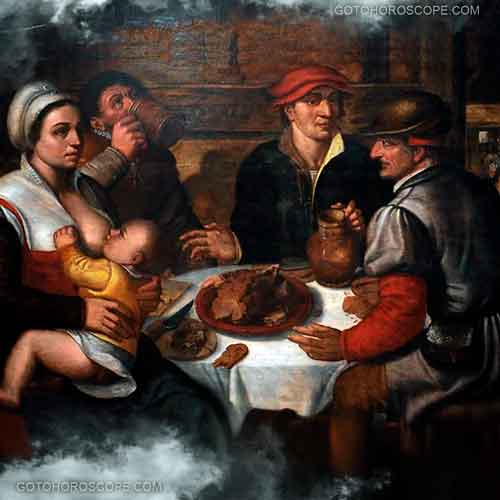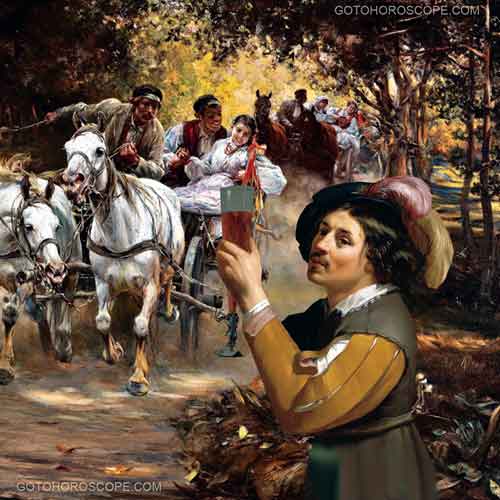The thirty-eighth gua, Kui, translates to Diversity, opposition, to be incompatible with, estranged, or to go against something. It is the inverse of Jia Ren and is associated with the twelfth month of the lunar year, or December in the solar calendar. In the thirty-seventh gua, the family is held closely together by a single force. It is a gua representing togetherness and harmony. The family in Kui, on the other hand, is actively diversified through a sort of centrifugal force expressing a disharmonious situation. The character kui originally translated to “eyes do not look at each other,” explaining that each person has a different field of vision. This definition demonstrates the individual perspective of each person and supports the concept of diversity expressed through the thirty-eighth gua.
The ideograph representing Kui illustrates diversity through the metaphor of sight. On the left side is a vertical eye. In the upper right, two hands facing away from each other suggest an opposition. Underneath the hands is a bow and arrow shooting at the gap between the hands, increasing the degree of estrangement. This ideograph depicts the original meaning of kui and provides an important metaphor to clarify the significance of Kui. As the inverse of Jia Ren, it is the pulling apart of what was once united.
Kui is Fire above Lake—flames stretch up to meet the sky while the water sinks deep into the earth. Fire above Lake expresses two opposing movements, but they still contain similarities between each other. Fire is brightness and Lake, representing joy, clings tightly to this energy. Although they are in a position that pulls them apart, there is still something holding them together. Fire and Lake are sisters—the middle and youngest daughters respectively. They will one day marry and become part of different families, yet there will always be their relationship as sisters holding them together. This exposes the key of Kui, which is to seek harmony in a diversifying situation.
It is impossible to avoid diversity, no two people see the world from the same perspective. The true lesson of Kui is not to discard diversity, but seek harmony in a disharmonious situation. When one finds themselves in opposition with a family member, the best course of action is to approach them with sincerity to resolve the problem. By resolving conflict or differences in opinion, harmony can be found. Kui teaches us how to find common ground among those whom we may normally oppose. This is the way to cultivate healthy relationships.
Kui relates to King Wen’s invitation to all those who opposed the Tyrant of Shang. A diverse number of people accepted his offer to follow the Zhou dynasty. Acknowledging this, King Wen explained that despite these differences, they could seek common ground and unite against the tyrant. He understood that each person opposed the tyrant for their reasons alone, so he needed to unite them by finding common problems. The most important commonality, of course, was opposing the Tyrant of Shang. This moment of King Wen’s journey demonstrates many opposing forces holding on to one another through one central force.
䷥ Kui hexagram
![Kui ䷥ Kui hexagram Illustration]()
䷥ Kui hexagram meaning
It is curious that fire goes up while water goes down.
Although they are different in form,
They have the same intention.
Reflection on seemingly trivial matters like this
Is still beneficial to you.
Bottom Line
![Kui Bottom Line Illustration]()
Bottom Line meaning
The missing horse returned on his own,
Even though you didn’t search.
Your worries are gone and you can relax,
Even if you see a villain.
Line Two
![Kui Line Two Illustration]()
Line Two meaning
You chanced to meet your master
In the middle of the street.
Your anxious fear was wasted – nothing happened.
Line Three
![Kui Line Three Illustration]()
Line Three meaning
As you walked the road,
You saw a loaded cart.
You shivered at the sight
Of the bull in the yoke,
Who raised his horns at you.
You quaked inside at the driver,
A felon with forehead inked
And nose cut off.
But they went their own way,
And everything turned out fine.
Line Four
![Kui Line Four Illustration]()
Line Four meaning
Leaving home, you walked alone,
Stopping short at the sight
Of a soldier binding his captive’s feet.
You feared a danger there,
But no one looked your way.
Line Five
![Kui Line Five Illustration]()
Line Five meaning
In a pleasant garden,
Is a family sharing food.
Should I not approach them,
And ask to share their meat?
Top Line
![Kui Top Line Illustration]()
Top Line meaning
I shut the door to my home
And walked through the town alone.
I came upon a mud-smeared pig
And a cart packed full
Of Guifeng Kingdom folk.
You noticed too and raised your bow,
But just as quickly lowered it.
These were suitors, not highwaymen,
And you brought them cups of wine.
The rain that began to gently fall
Was a good omen for their errand.







Comments: I Ching Illustrated Book of Changes